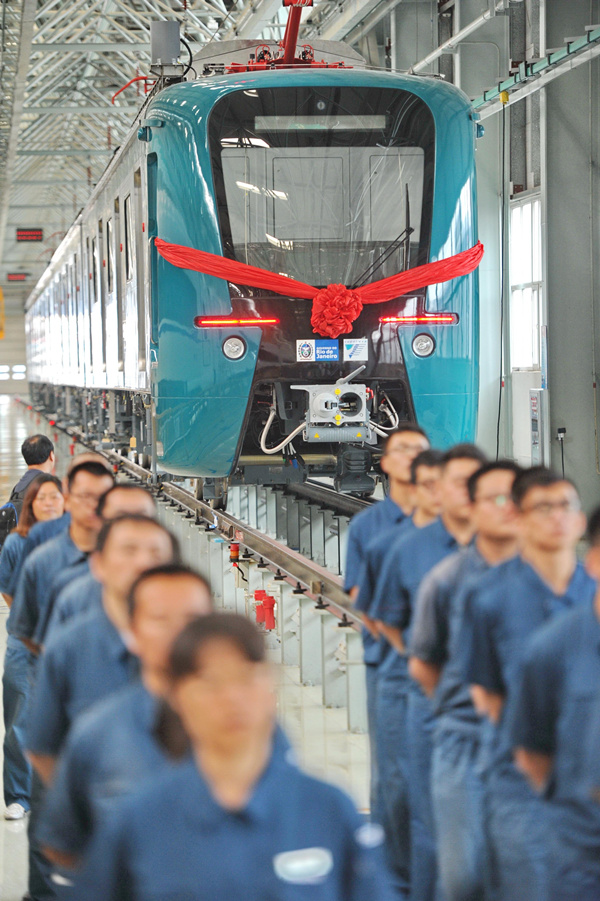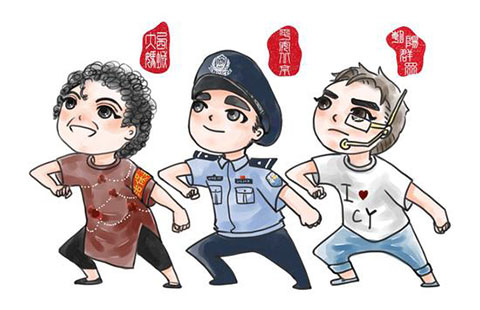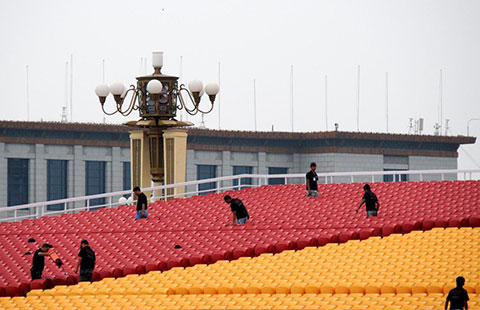Chinese subway trains completed for Rio Olympics
Updated: 2015-08-24 04:54
By JI YE in Rio de Janeiro(China Daily Latin America)
|
|||||||||
 |
|
The last electric train produced by Changchun Railway Vehicles Co for Brazil is completed in Changchun, Jilin province on Aug 19. The 100 trains made in China will come into service for the the 2016 Summer Olympic Games in Rio de Janeiro. Zhang Nan / for China Daily |
The last electric multiple units (EMU), a type of intercity, high-speed subway train produced by Changchun Railway Vehicles Company for Brazil, was completed in Changchun, Jilin province on Aug 19.
The 100 trains will come into service for the 2016 Summer Olympic Games in Rio.
The Changchun Railway Vehicles Co belongs to China CNR Corp Ltd, one of China's biggest train makers. CNR started to research the Latin American market in 2004. Three years later, when Rio was chosen to host the 2014 World Cup, the government of Rio vowed to improve the city’s rail network.
In 2009, when Rio won the contract for the Olympics, the city government eventually began to sign contracts with CNR for the China-made vehicles, with CNR selected over Siemens and Alstom.
CNR was first given orders for 30 EMUs. After the first specially designed subway train arrived in Brazil in March 2012, CNR won another 70 EMU orders because of the train’s high performance and comfortable interior.
Over the past six years, CNR provided 100 EMUs for Rio, and its vehicles will make up 82 percent of Rio's urban mass transit.
It will also mark the first time that a Chinese train maker has taken part in an Olympic transportation system outside of China. To meet bid requirements and win contracts, CNR offered more high-tech, cost-efficient solutions and special adjustments to meet Rio’s needs.
Composed of six cars, the subway train can carry 2,240 passengers at a maximum speed of 100 km (62 mph). The train is equipped with an overspeed protection device, which automatically sounds an alert and helps slow down the train when the speed limit is reached.
Made of A-type stainless steel, the train has a far greater compression load than a normal train, ensuring passengers' safety in the event of a head-on collision, for example, with an 80-ton truck traveling at 36 km per hour.
The train is equipped with China's first single air-conditioning unit that has a refrigerating capacity of 50 kilowatts, which will allow the train to operate comfortably in temperatures as high as 56 degrees Celsius.
In addition to the Chinese trains running along two of the city's subway lines, the new Line 4, expected to be ready in time for the Olympics, also will use Chinese trains.
The government of Rio has promised to the International Olympic Committee that Line 4 would be completed before the Olympics start. CNR delivered the subway train ahead of the contracted delivery date to ensure the rail system’s operation before the opening of Line 4.
Currently, a total of 19 trains built by CNR are capable of transporting 840,000 Rio residents per day.
"The new trains are much more comfortable. Everyone knows Rio is always very hot, so a working air conditioner is very important," said Melene, a local resident who takes the subway to work daily.
Wang Huaifeng, commercial director at CNR's international division, said the trains were custom-made for Brazil, taking into account the average temperature, operating conditions and passenger capacity.
Roberto Marques da Costa Neto, president of a Brazilian transportation and logistics company, said the Chinese trains are excellent performers, and Rio residents get to experience the high quality of products made in China. The vehicles also help promote cultural exchanges between the two countries.
"I hope that more Brazilian cities could have the opportunity to enjoy China's first-class train service," he added.
- Tsipras formally resigns, requesting snap general elections
- China-Russia drill not targeting 3rd party
- UK, France boost security
- China demands Japan face history after Abe's wife visits Yasukuni Shrine
- DPRK deploys more fire units to frontlines with ROK
- DPRK, ROK trade artillery, rocket fire at border

 Giant panda Bao Bao celebrates two-year birthday
Giant panda Bao Bao celebrates two-year birthday
 Across America over the week (Aug 14 - Aug 20)
Across America over the week (Aug 14 - Aug 20)
 Stars in their eyes: leaders in love
Stars in their eyes: leaders in love
 A survival guide for singles on Chinese Valentine’s Day
A survival guide for singles on Chinese Valentine’s Day
 Beijing police publishes cartoon images of residents who tip off police
Beijing police publishes cartoon images of residents who tip off police
 Rare brown panda grows up in NW China
Rare brown panda grows up in NW China
 Putin rides to bottom of Black Sea
Putin rides to bottom of Black Sea
 The changing looks of Beijing before V Day parade
The changing looks of Beijing before V Day parade
Most Viewed
Editor's Picks

|

|

|

|

|

|
Today's Top News
China advocates practical cooperation between LatAm, East Asia
Giant panda gives birth at Washington's National Zoo
Emissions data won't change China policy
Preparations shutter Forbidden City, other major tourist spots
President Xi Jinping calls for crews not to ease up
Chemical plants to be relocated in blast zone
Asian sprinters on track to make some big strides
Jon Bon Jovi sings in Mandarin for Chinese Valentine's Day
US Weekly

|

|







